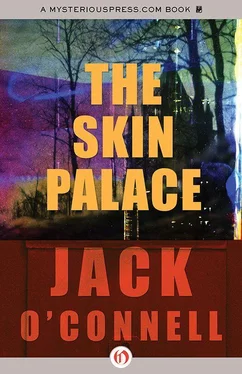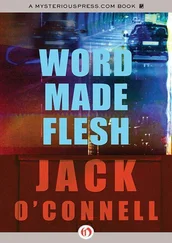“It’s funny, Sylvia,” he takes a breath. “But until ten minutes ago, you didn’t know those kids back inside really existed, did you? And for eighteen months I’ve been the one leaving them food and clothing,” now he stands up, his voice rising with the movement, “so before you start to lecture to me, maybe you better run home to the little love nest you and wunderkind Perry—”
“What,” she yells, her voice echoing through Bishop Square, “do you want from me?”
Propp folds his arms across his chest, pleased, as if he has willed all their words to this specific point.
“I want,” he says, “for you to spend the rest of the night with me. I want you to reload your camera. I want you to see the world underneath Quinsigamond. The other place. At least once.”
There’s a pocket of silence that builds as they stare at each other. He unzips and slides out of his coat, hands it to her and says, “It’s getting cold. Put that on.”
And she does. She puts her hand in the pockets and touches canisters of film.
They walk down Voegelin Avenue, straight into the heart of Bangkok Park. She may be a tourist in the Canal Zone, but in Bangkok she’s an absolute alien. Except for that one mistaken wrong turn that brought her down here fifteen years ago, she’s never ventured into the Park. It’s a part of the city that’s turned into more of a dark myth than a genuine location, a tenderloin only mapped by fearful rumor and bad-tasting jokes.
But Propp seems to know where he’s going and she follows, her camera tucked inside the jacket, making her look pregnant with some harshly angled fetus.
They walk on the Little Asia side of the street, the frontier where the Latinotown border ends. The storefronts are all tiny noodle joints, mini counter-service galleys where maybe ten people can squeeze shoulder to shoulder and eat a soy-based goulash under the blue glow of a wallmounted television. She doesn’t hear a word of English. Propp links his arm through hers like an attentive father.
“Aren’t you afraid you might be recognized?” she says.
He laughs, picks up the pace. “Down here? You kidding me?”
“There could be some Proppists, you know, touring the Park—”
He shakes his head. “They don’t have a clue what I look like. Even the ones who think they do are wrong. Ridiculous bastards.”
“You’re so harsh,” she says. “These people revere you. They love your work.”
They come to a stop at a small booth-like store just crammed from floor to ceiling with electronic gadgets, mostly camera and video equipment. Propp pulls them inside and the guy behind the register nods to him. The clerk is Asian, old and bony and with a crew-cut cover of white stubble on his skull and a large-handled pistol protruding from the elastic waistband of his loose, black, silk pants. He’s wearing a red T-shirt with Peter Lorre’s face silkscreened on the front and Sylvia wants to ask if there’s some connection with the film festival that’s on TV all week. But she keeps quiet and Propp takes a twenty from his pants pocket and slides it onto the counter.
“I think we’ve got enough film,” Sylvia says, but they both ignore her.
“Where’s Johnny Yew?” Propp says to the clerk who just stares at him and shrugs, rings in the purchase on an old tin register, then tears what look like two green movie tickets from a roll mounted beneath the counter, rips them in half, hands the stubs to Propp, and presses a buzzer mounted under the lip of the register.
Propp bows his head to the man and instead of exiting, leads Sylvia to the red-metal fire exit door at the rear of the shop. He pushes the door open and they walk through to an empty foyer, a cubbyhole of four blank brick walls and another metal fire door, this one painted green. There’s a small closed-circuit security camera hanging from the ceiling and it pivots in their direction as Sylvia watches it. Propp holds the ticket stubs up near the camera’s lens and another buzzer sounds and they push through the green door.
And out onto a narrow wooden catwalk that looks down on what appears to be a massive warehouse, a huge brick windowless loft area, as big as an airplane hangar. The ceiling must be twenty, maybe thirty feet high and lined with rows of hanging fluorescent tube lighting that gives the whole room this pale white, blanched-out cast like the interior of an alien rocket ship in a bad movie. The floor of the place is divided into a dozen aisles by rows of plywood booths and long picnic-style tables. Behind the tables and booths are people in canvas aprons and kelly green baseball caps. They seem to be salespeople and they’re all in varying speeds of motion, using exaggerated hand gestures, explaining and cajoling, bartering and hawking whatever their individual product might be.
The catwalk runs all the way around the interior of the building and at each corner there’s a man sipping something from a white Styrofoam cup, looking over the rim of the cup down to the sales floor. They all wear nylon wind-breakers and Sylvia would bet that each has a pistol underneath like the Oriental clerk out front.
“Welcome to the flea market,” Propp whispers in her ear.
She follows him down a stairway to the floor. There’s no way to tell without windows, but since they entered the electronics shop at street level, half the flea market must sit underground.
Propp takes her arm again and they start to stroll down the first aisle they come to.
“I’ll tell you what I feel for the Proppists,” he says, continuing the discussion from the street as if there’d been no interruption and saying the last word with a touch of disgust.
“What’s that?” Sylvia asks, turning to avoid bumping into a woman carrying cardboard cartons upon her shoulder.
“Pity,” Propp says.
“Pity,” she repeats.
He shakes his head yes and says, “Would you like some cotton candy?”
She shakes her head no.
“It’s a shame,” he says, “that they don’t have lives of their own. Because why else would they insist on trying to turn me into something I’m not. Jesus. They run around to their ridiculous little pajama parties. All their semantic bullshit about separating the erotic from the pornographic. That pathetic willed innocence.”
She stops him from walking on.
“First of all, by insisting on being the invisible man, you had a big hand in turning yourself into their legend—”
“I resent that,” he interrupts.
“And second, I met one of the people, and I may not agree with his mythmaking, but it goes way beyond you, Propp. It’s about something they think you represent.”
“Which is?” with this self-indulgent smirk on his lips.
“The erotic impulse.”
“The erotic impulse,” he repeats, about to break into an insulting laugh.
“That’s right,” she says, for some reason wanting to defend Rory Gaston and company.
“That’s catchy,” Propp says.
He turns and releases her arm, reaches down to the table they’re standing next to, picks up a figurine and tosses it into the air in front of her face. He moves off down the aisle and she bucks and catches this little sculpted figure, this little knicknack, and looks at it. It’s made of some kind of black enamel cut into a human shape. It’s male and completely, stunningly, anatomically correct. It’s some kind of fertility totem, like a peasant deity with genitalia whose size is almost equal to the mass of the entire body.
“That’ll be ten ninety-nine,” a woman’s voice sounds from behind her. “Or I can let you have three of them for twenty-five.”
Sylvia turns to her, a big bruiser of a woman, arms like a linebacker, her green baseball cap pulled way down to the line of her eyes, the smoldering stub of a thin cigar dangling at the edge of her mouth, the head of ash bouncing as she speaks. She waves her hand out and Sylvia looks to see an entire table of these figures, a crowded buffet of fertility Hummels stacked side by side like an army of erect soldiers ready to impregnate some huge village.
Читать дальше











